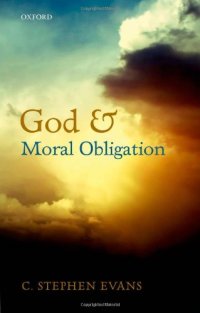
Ebook: God and Moral Obligation
Author: C. Stephen Evans
- Tags: Ethics Theology Reference Almanacs Yearbooks Atlases Maps Careers Catalogs Directories Consumer Guides Dictionaries Thesauruses Encyclopedias Subject English as a Second Language Etiquette Foreign Study Genealogy Quotations Survival Emergency Preparedness Test Preparation Words Grammar Writing Research Publishing Philosophy Religious Studies Religion Spirituality Morality Politics Social Sciences Humanities New Used Rental Textbooks Specialty Boutique Christianity
- Year: 2013
- Publisher: Oxford University Press
- Edition: 1
- Language: English
- pdf
Is there a connection between religion and morality? Ivan Karamazov, in Dostoevsky's The Brothers Karamazov, famously declares that if God does not exist, then "everything is permitted." Most philosophers reject such a view and hold that moral truths do not depend on God. C.Stephen Evans argues that the truth lies somewhere between these two claims. It is not quite right to say that there would be nothing left of morality if God did not exist, but moral obligations do depend on God ontologically. Such obligations are best understood as God's commands or requirements, communicated to humans in a variety of ways, including conscience.
In God and Moral Obligation, Evans also argues that two views often thought to be rivals to a divine command morality, natural law ethics and virtue ethics, are not rivals at all but provide necessary complementary elements of a comprehensive morality. A number of objections to a divine command account of moral obligations are posed and answered. In the concluding chapters Evans points out the advantages such an account has over secular rivals. The authority and objectivity of moral obligations are best explained by seeing them as divine commands.
In God and Moral Obligation, Evans also argues that two views often thought to be rivals to a divine command morality, natural law ethics and virtue ethics, are not rivals at all but provide necessary complementary elements of a comprehensive morality. A number of objections to a divine command account of moral obligations are posed and answered. In the concluding chapters Evans points out the advantages such an account has over secular rivals. The authority and objectivity of moral obligations are best explained by seeing them as divine commands.
Download the book God and Moral Obligation for free or read online
Continue reading on any device:

Last viewed books
Related books
{related-news}
Comments (0)